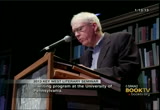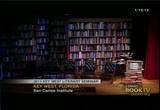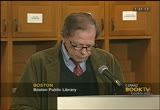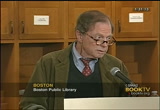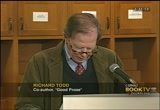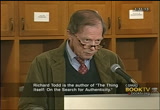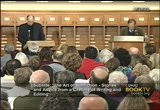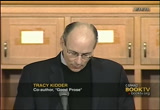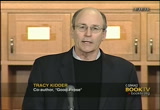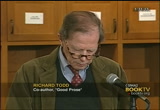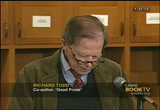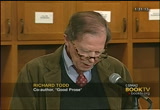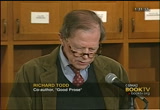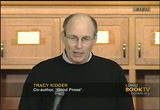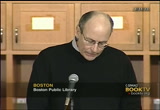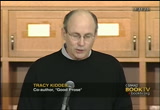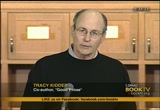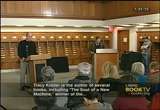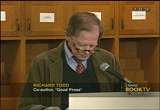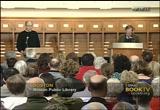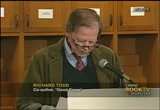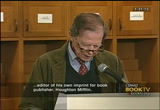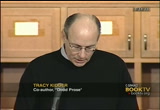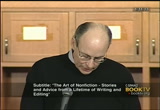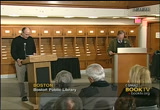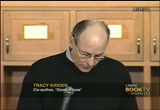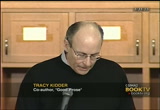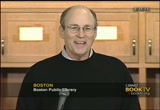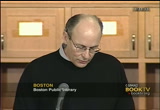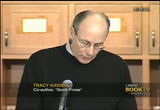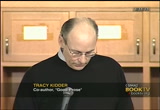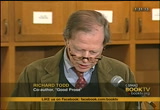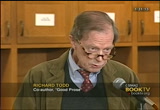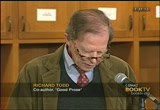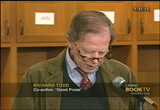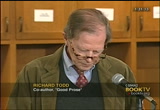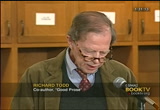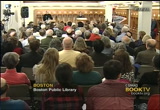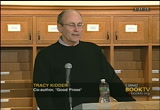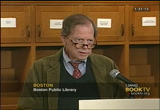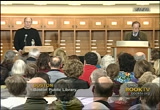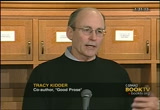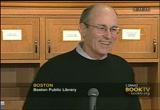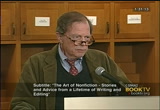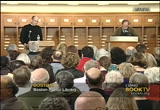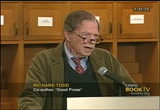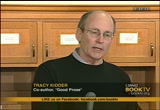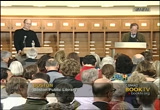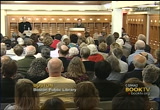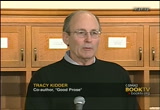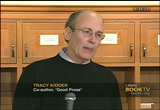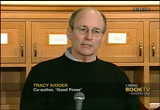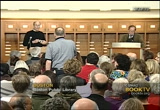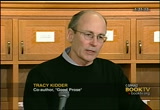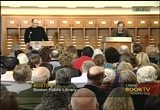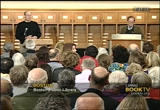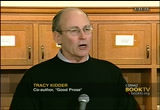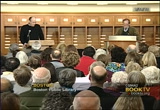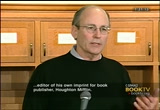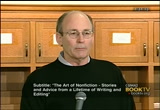tv Book TV CSPAN February 17, 2013 11:00pm-12:00am EST
11:00 pm
11:01 pm
11:02 pm
11:03 pm
together. up to this point it is described we talked some more and the book that we looked for emerged. the scholar looking at the manuscript some isn't that we destroyed the evidence. there is no evidence. we haven't left a paper trail. the marks i made on the pages are useless and in any case i prefer the spoken word over the 40 years we learn about writing and editing nonfiction and we try to write them down with the collaboration of meaning this
11:04 pm
time i had to do some work. all books pose a problem for the writer the end of this one had to do with the two writers they often talk about the point of view. what was the point of view here? who was telling the story? one thing we can clear about the start i can comfortably used the word we. but the plural there are some genuine things we want to see together for advice book a larger structure is written in the third person who tells
11:05 pm
stories about our work with each other. in sections of the book is a complicated little stricter but i and we end of day and whoever think it works. tonight we will be faithful to the structure by leading passages in both modes with a recollection the first part of a call for the atlantic when i was an editor follow the first chapter in the beginning and then we will go on from there in. >> i just want to tell you a little story about this book. in 40 years of working with someone you come up with habits
11:06 pm
and towards the end of the book we write the bad reviews. i was especially good at this. it's a kind of magical thinking the notion if you thought of all of the bad things someone can say then it's already been said. the public didn't always work and the notable location one -- occasion said we think there's one 3g we've got to write. he wrote the best review on this look of hours to -- book of ours [laughter] >> the first time i worked with him was over the phone back in
11:07 pm
1970 to we talked about an article i was trying to write in a conversation like this. what was wrong with my article i asked. well, first of all she was sorry to have to say this but he wanted a spectacular opening and in the spring of 1971 someone who went mad for blood in the sacramento valley. a student in iowa had praised and he said there was melodramatic. reminded of the conversation 40 years later she said with a touch of irony, which i hadn't heard in his voice back then, well, i guess i stand by that judgment. >> he has the following passage
11:08 pm
in the beginning it's what might be called to talk to strangers you might begin by trusting them and i imagine this reader intelligent for yourself you might know something as the leader doesn't know but it helps grant the reader has knowledge this isn't generosity it is realism. good writing creates a dialogue at moments questioning, criticizing. what you know isn't something you can pull down from the shelf and deliver. what we know is what we discover in the course of writing it in the best conversations if you
11:09 pm
and the reader are discovering together. writers are often told they must grab or capture the reader but think about those metaphors. it seems a violent in compulsion with the relationship you might want to have with a criminal, not a reader. there's an exercise in limit. you can't make the reader love you in the first sentence but you can lose them right away. you don't expect the doctor can surely alienate you. there is a lot to be set when. the most remarkable first line the sentence is so well-known that sometimes cited of context it is understood as a magisterial command that moving from the pulpit is more than an invitation and given the
11:10 pm
complexity that follows is simple if you will probably find yourself saying it rather softly you can't tell it all at once. it's deciding what to say or never at all. take one thing at a time. prepare the reader. tell them everything they know to move on and tell them of more. they are instructed not to bury the lead, that is to make sure they tell the most important story first. this translates poorly into the longer forms of writing. the story is a place to arrive, not a place to begin. of course the reader needs a reason to continue but the best is often simply confidence that the writer is going someplace interesting. one morning they come over the
11:11 pm
national public radio in an interview with a jazz guitarist who remembers working with the great miles davis. he recalls that he once advised him about how to play certain songs. play it like you don't know how to play the guitar. she had no idea what davis meant but it was better than he ever imagined he could. a writer can make some sense of it. don't concentrate on the techniques that can be what is concentrating on yourself. give yourself to your story coming your train of ideas or your memories don't be afraid to explore, be willing to surprise yourself until there's a trust of another kind of work at some point you must trust yourself as a writer. you may not know exactly where you are going but you have to
11:12 pm
sit out and at some point the calculation the reader will honor the effort itself. the british colony where it remains an official in the second language to have an interesting usage. if they do something particularly well he's told he tried but might well be an insult and english the recognition that in tension lies at the core of their achievement they want to see you try, not trying to impress that trying to get somewhere. >> back in the first person. this is how the opening sentence of mine was prepared. for months and months iraq and a voice on the phone delivering bad news about my article. it didn't take me very long to
11:13 pm
fix the first problem of the opening sentence in the spring of 1971 someone went mad for blood in the sacramento valley. only after a few visions the sentence read in may of 1971 the police in southern county california began to find men buried in the ground in the city in the central sacramento valley. the memorable sentence was clear enough and it no longer had the sound the was millo dramatic supplied by the author. but he kept finding problems in my article with my attempt to describe the child complex most of which i had witnessed and still about a thousand pages of notes were a few pages of the manuscript manage to convey the fact of that and some of its
11:14 pm
flavor and the occasional weirdness. for starters, how to overcome the perfectly sensible conviction that this can't be done. time after time i rewrote, wait a few days and then called them up only to hear that my account was still at best confused. at first i felt like reading to him it was of 2-cd but of course i couldn't yell. so while i tried to use it to be acknowledged sometimes when he replied there was a werries sound and his voice once or maybe twice a snort to tell me that what i had said was preposterous but he never raised his voice. i didn't keep the notes i made during the conversations or the
11:15 pm
draft i wrote about in that article i set out to write a novel but the interesting thing was the margin for biography but there was no biographer now. my dreams of writing something classic with the necessity of writing something publishable this was it for me. i think i would have gone to law school if he simply called the article as he should have done as i would have done in his place. months of reading the same for a pretty unimportant story some years later i raise the question
11:16 pm
and she said he is willing to work as hard as the writer of some of the letters come into the world believing that we have favors when we ask others to read what we have written. i like to think that during those many phone calls began to learn when someone takes the trouble to read i feel grateful even if i don't. but i did feel grateful once the article was finally published in the atlantic report comment he was the editor back then and said that he was impressed with the work that i had put into the article. it didn't say that he was impressed with the article itself. he was honest, not unkind but at the time i didn't care. islamic we write about
11:17 pm
three-fourths of nonfiction but the memoir that we know best what constitutes the good nonfiction story. some begin by spending only a day or two it has the essential element of the story that then they try to tell at. the approach has its advantages rather than memorizing the map the danger doesn't fly on making the state but committing too soon it may be hard to abandon when it proves unworkable. conversely some writers liberate the days, weeks, months on end until they feel shorter plan you never know if you understand your story there's a little
11:18 pm
ground to proceed the enthusiasm and the writing blocks lover where the blocks will go in the connections among them. in the end you have to try to find the method that works best for you. most riders to solve this problem and how their salt doesn't matter at all to the reader. it helps what after all is the story? it is not a subject. a good story may include a good deal of information on any number of topics or issues and it may blossom of infestation the story is in the individuality of the time they are the stories in the trials
11:19 pm
the sacrifice narrative's to the chase and the triangles of good and evil to use it to achieve maybe most nonfiction writers are looking for narrative so to find the real thing because they don't usually work as expected. even if history has already happened the writer has to reconstruct isn't always when he disappears if he looks in this photograph the parties settle lawsuits in the trial. nonfiction writers especially one and the narratives are vulnerable to the disappointment i don't have a book, the young writer says when the defense don't deliver the trauma in
11:20 pm
which everybody recognizes the story. but what is missing more often than not is this is a broadly of thinking about what makes a good story. it is a misleading truism. conflicting stories are generally between good guys and bad guys but the most important happens within the narrative the story begins with a character and ends with a person the author and the reader understand better than before. the series of defense that yield however quietly the dramatic truth but one tells this kind of story the narrative of several issues revelation, someone is learning it to transform without it means asking is that all? it is a challenge for the
11:21 pm
nonfiction writer especially under the cliffhanger story. it's often a potential power for the writer who hasn't had the story. for a story to have the chance to live to be something important at stake, a problem that confronts the character and the reader in trying to understand them. the unfolding of the problem and its resolution the car chase is not required. >> for me finding a story that i want to tell is dependent less on the met said the dannel of my college teachers oppose the luck of the perception.
11:22 pm
they began with a chance encounter, suggestion from a stranger, notion that seems like great spending i know nothing more thrilling than the arrival of a good idea. the problem is the good idea seems to arrive on schedule to their own and sometimes badly. i once had an idea for a book that came from my experience having bought an old house the landscape changed for me the first time i looked at buildings and saw the craftsmanship or the lack of it read a few years later i was able to hire a team of carpenters, admiral craftsman who straighten out some of the messages that i made. my idea was to write a book largely about them and it would be the general subject the story would follow the carpenter builder of some sort of a conception project left to be
11:23 pm
identified i tried this beyond editors, agents, no one liked so i gave up and spent nearly two years looking into other possible that these and invented a book about the captain of industry that i managed to arrange just one interview in the new york city skyscraper besio told me it could be afford to be written about because he didn't want the world know how little. at the time i spent with him trying to figure out what to have for lunch i wrote a few articles about the tests and went out west thinking i might write a book about wilderness but when i tried this idea on the editor it was an admirable
11:24 pm
character he said will this be writing about our beautiful places and finally i said you know i would really like to try to write a book about carpenters and i remember why i hadn't told him that before. i ended up falling not just the team of carpenters but the principals involved in the building of a single-family house the research took about a year and then assembled in the index more or less from my office to try to make sense of what i had observed i imagine this moment with a good transition as much the same for the nonfiction writers in the offices apart from the world hoping there are stories in them who but once again unsure. but those times i heard the
11:25 pm
voices and i started writing without much of a plan but this time was different. i actually felt column as i sat looking out the window listening to the book i wanted to write what i heard was the sound of my mother's voice reading to me the sound of an old-fashioned model and i recall i had been writing quite happily but i went to a cocktail party and they asked me what i was working on the i told them what and they said you are writing a whole book about the house and ordinarily i would have bet said but by then i thought it was a good story that seems to be opening in many directions and i was fascinated by the architect with the homeowners and builders and the sometimes relations among them
11:26 pm
with a menage a trois without sexual connotation but craftsmanship and the multi dimension stories but only if i told them the whole thing and that would take much too much time and effort which. i wanted to keep it all on paper. i tend to worry now when a story in summary found interesting or even worse i believe there's one short dictum about one judging a cocktail party rule isn't always a bad sign on a potential offload. >> the last chapter the last
11:27 pm
effort has been edited but not exactly inconsistent of what looked like when we first met after reading my first offensive describing him as a curmudgeon. [laughter] anyway, here is the last bit from my part of that. i like to remember the first book we worked together on the machine, not just the luck of the time of working on that and the special phase one that took a week or maybe to help the atlantic.
11:28 pm
>> i love that especially after hours but then when i was there at night working on an article i would take a break and wander the halls in the night watchman i could wander into an office in the the letters that were published in the atlantic studying the signature the computers would prove not to be considered the facsimile of a book that are sometimes on for articles shedding plenty of
11:29 pm
light across the floor in itself as we walked upon the titles and they helped us with this why do we get only to to this? he picked a couple pages up off the floor instead of a passage [inaudible] that is when i began to learn what works for me and how to fall in love with my own work and much harder of course how to go from perfectly lovable to nonetheless will hold. by that time we were done there
11:30 pm
were ashes into the small litigated the edges of the manuscript. he said this is a pretty good book, i don't think that i've read another quite like it. the highest praise i had ever heard from him and i would start to wonder what i should do next. for me nothing much had changed since then. >> [inaudible] >> you can imagine what a shock it was for me to find my friend, the distinguished journalist celebrated in the areas in a single paragraph including but
11:31 pm
not limited to the estimates the i was about a foot and a half shorter. [laughter] in any case, she had accused me of disingenuous it's true. being perfect means not being sincere to even realize it. i like what i see that it's not to envision a piece of writing the potential is sometimes more exciting than reality. i dwell on the possibility of the pros as an editor's model.
11:32 pm
note writer known to me is so energetically and enthusiastically as peter the great gift to be able to consider george -- consider your own as the things that we learned in advising perhaps the most important to sacrifice. sometimes the chapters and themes that are perfectly good must go for the good of the whole. all good writing is a contest. every good passage means something instead so it ought to be hard but you don't need to make it harder than necessary. the best thing an editor can do and this is most satisfying part what the work collaborating in the loveless structure the process over the years is great
11:33 pm
comfort to both of us. it's predicted the significance and we read it aloud alternating chapters and the other of making little checks in the margin when something seems off i know this isn't universal and for understandable reasons it is inevitably adjacent the writer cannot hide for the sound of his own voice and of the writer and editor in like that it worked in plain view all along blatant and full of reproach. satisfying as it is to correct them at last you know that some of the wonder remains undiscovered. all books are in perfect. john updike once wrote the lifelong pleasure of receiving the first copy of the book from the publisher a pleasure he said
11:34 pm
that last until you find the first typo. at some point in the proceedings this whole book is a draft and i mhra man with my own lines in that passage keep me from ever competing anything. in the long course of the book and in the career we have disagreed and even meddled one another we've never exchanged an angry word that helps we were but we also had our well established rules when we have recently experimented late in our association after we have been working together it after size itself as cultural criticism it was that but it's
11:35 pm
closer to the end and it became increasingly personal. he returned a few days later and i opened it to see his hand large and legible completely unlike the remarks i tend to make in the margins marching through the pages leaving the various messages none of them walking in candor. the most memorable instruction was and this. [laughter] i was fully recovered within three weeks. it wasn't until we were deep into the present book that i felt the poll of the other worldly power of the reversal. he was trying to control me into a piece of work and decided to keep the advice on the excess.
11:36 pm
11:37 pm
told us on reading things. do you do it only to each other or do you judge the quality by reading to others in your circle? >> i have had a long career of reading things i've written about people. [laughter] i used to read some things about my wife. [inaudible] [laughter] >> not with us tonight. [laughter] it's just i try to do it less often than i used to. although i feel sometimes reading passages that i used to. [laughter] usually isn't but that's the most useful reading a lot of
11:38 pm
times. yes? >> i would like to hear a little bit more about how you pick the stories, or do you actually wait for them to descend, and what happens if a couple of years goes by and it doesn't? or do you go out really looking for ideas and how does that happen and once they have been, how do you first put pen to paper? as a structure or as a ? >> well, first, those are two questions. what do i do? i think occasionally, tracie has -- we say story is not a subject, and it is not. occasionally, someone has suggested, i have suggested, not
11:39 pm
by alone, why don't you look into this. computers was sort of a novel thing. why don't you find out about computers? but that's not really -- that is the grossest kind of beginning. what i have noticed is that a story begins for tracie with character. that is when she finds somebody that he's interested in and enthusiastic about. then the story proceeds from that. >> but sometimes that has taken me -- i am ashamed to admit -- two years for something -- i find ways to occupy myself. i have any way. sometimes self-destructive ways in the past. [laughter] as for what happened, i take lots and lots of notes. i like to take them long hand
11:40 pm
although i have used a recording device. largely i got enough have it from my last book where the previous to this i met with the young man who didn't want to be seen taking notes openly in public given where we were. and i -- but so my life was divided into parts. i think all of these notes i talked about my research everyday and at some point i decided to try to start to write, but i do try not to spend a lot of time making elaborate plans. sometimes it is just a list of things that i think should be there and i just start to write and i write as fast as possible. i like to say to prevent remorse for having written badly, and then i go back and buy real right and he says it's fine, keep going. we get to the end and then start
11:41 pm
over. usually ten drafts or so of a book, but there are fewer changes usually. >> yes, we narrowed it down. >> that does get closer to the whole. >> whether you pay please get badly. >> yes. >> people say that you love all of your children equally but if there were one book do you have a favorite or is there a book that you call to mind as your favorite? >> first of all that is a really bad saying. one may be differently but just as strongly to love them all equally -- weld -- [laughter] i don't know.
11:42 pm
i guess the book that was most useful to me i haven't read it and i like it that's why i don't want to read it. [laughter] life always looked back on house but i haven't reread that either for the same reason. i think that -- i don't know. i think the best piece of work i did was mountains on mountains about a farmer but i've never let a book debt printed that isn't as good as a book i could write at a time and i always was surprised they wouldn't let me do that. what is your favorite of the things you've worked on? >> i have a sort of country in favorite. my books that is the favorite is a book i can go back to endless
11:43 pm
pleasure just picking up is a memoir in which he is free from the bond of reporting and heritage and entertaining. >> my mother hated that. [laughter] >> someone said i'm afraid this book is almost a comic and to my pierrick as we worked on that it was more than almost, it was a very funny dhaka. >> way in that. >> i'm wondering whether you wrote this book from your own experience in writing or did you
11:44 pm
write it also against other sources and to books that have been written about writing? >> for my part i never read any of those books, promise not one of them. >> i have read them through the years we provide a list but actually i think it is a good one but the benefits from the suggestions of people but admire those books. i don't claim to be an expert on that whole genre that we now participate. but in my experience they are useful. rather deliberately we didn't try to turn to them and do a
11:45 pm
comprehensive analysis and we try not to be influenced. we take a couple of fights with one or two of them now and then, just some sort of a side. so there's that. [laughter] i also think what we try to do is write about ideas and thoughts. we wanted to talk -- everything in this book is something we all learned in the course of working together over 40 years so all of that material is presented in two different ways and it's derived from our experience not just writing although most of our working together as writer and editor would also readers
11:46 pm
>> we have one of the best of these books which says needless words and then we start thinking about what is a need this word and we quote the speech never, never, never. which one would you leave out? [laughter] >> yes? >> the book is changing and in terms of electronic media etc i love audio books. many of your books are audio books. how do you really to audio
11:47 pm
books? >> i am all for them. i've read a couple of those. the most it was fun and it can get tedious because you mispronounce one word or stumble you have to go back and do it again it could take a long time. but the worst experience that i have with that is reading the abridged version and i know that there was a bridge but still, i got to the tight skirt and there it was in the studio and i started reading it i could tell i was two sentences in. but i enjoy doing that. i did like being read to a lot as a kid. and as i said, i liked reading
11:48 pm
aloud to people probably more than they liked being read to. [laughter] >> are you ready clacks >> can you talk a little bit about how you came to write the machine? >> sure. on was in his office at the atlantic. i had finished the best piece i could i think what is about the vietnam combat veterans. it was the hard way to make a living. you didn't get paid a lot. i think i spent months on that article. and i was kind of getting my reward. my reward used to be first, you know, protect manning the expenses and sometimes more and
11:49 pm
then lunch at the ritz or nada taj although we have tea at the taj and looked just like the ritz. [laughter] any way we sometimes found more time in his office and drinking having gotten started -- i tell you what i'm making this a long story. what happened is somehow by the time i got back to his office i felt it was his responsibility to tell me what to do next. but not another article. i wanted to write a book because i had this idea that somehow i could make a living if i did that. and he said why don't you look into computers? i thought that was pretty funny actually. and i said something what about computers? there was still rather mysterious machines. to me there was no such thing as a personal computer. and he told me there was a thing out there called the many
11:50 pm
computer and that is really amusing. and then he knew a person there was leading the team, who works for a computer company that said i should talk to him and so i did and that was a guy named tom west who sadly died last year and he was indeed in his team of engineers working on a computer. that is where that started. if didn't think it was a very good idea but after i talked to this guy i was so puzzled and fascinated that i thought i ought to go on a little further in i remember coming in a few days later or a week later or something like that.
11:51 pm
they started talking about the engineer who and he talked about what he called the war and people that shot from the hip and there was blood on the floor. it's like my first sentence of the article earlier. [laughter] really as far as i could see he was talking about dhaka creation of the plastic boxes and i felt this is kind of interesting and it was. that's pretty much what happened. right? >> yeah. [laughter] >> whoever the microphone close. >> what do you think is your best characteristic to allow
11:52 pm
people to accept you as a flight on low volume with order which always makes me love your books? thank you. >> i guess you can't answer that >> i don't know. i try to become i don't always succeed pietro to be a guest in the lives of the people that let me enter and i do try and i've done this more and more conscientiously as the years have gone by and i've gotten smarter about this for the most part i've written about private people so-called ordinary people i'm not sure there is such a thing but people that have a complete lack of their privacy and like the public figures such as to make sure that they were really willing to let me do this
11:53 pm
and then try to be as pleasant as possible. when i was traveling with sort of gathering hypochondria i'm not always as good as company. >> people who know tracie wonder how she does this because he isn't the quietest person in public and in private life and he genuinely has a lot to say but i finally realized he gets it out of his system moving forward before he works on the book. he is very quiet with his subjects. >> going off of that, do you hear from your old subjects? do you keep up with people that you have written about?
11:54 pm
>> he said that we should get them together in a room and let them have at its. [laughter] >> some of them i do. some of them i've fallen out of touch with but not completely. >> it is a remarkable record really because most journalists find themselves walking around the corner to avoid people they've written about. but these relationships which are complicated even when they are well intended on both sides the work out well. >> yes it worked out pretty well. you probably want to know [inaudible] noeth? [inaudible] i used to hear from him a lot.
11:55 pm
since the earthquake in he i've written him only sporadic. i used to see him a few times a year. i did see him two or three months ago but it's pretty rare now. >> [inaudible] >> the schoolteacher, we have to stop pretty soon but i will tell you a quick story to get one of my proudest moments retired as a schoolteacher and then as a school principal, she had become reluctantly, and now she's in the nation's largest second st. patrick's day parade and named the grand marshal which is a grand honor indeed and i went to the dinner. there was a high school band -- the majority of the students who come it was a choir, sorry, not
11:56 pm
a band, they were singing beautifully. the problem was they had been drinking quite a bit and making a lot of noise. when it was my turn to get up and talk i got up there and said you are making all of that all -- alcohol induced malaise trying to sing to you none of you were ever in ninth class. [laughter] i haven't seen her for a while though. a few people have died, almost everyone i wrote about in old friends.
11:57 pm
>> [inaudible] >> great. >> am i right to assume that you incorporated [inaudible] and how did you make that adaptation? >> i did not. where did that title come from? >> it came out of your brain and believe it or not. and it nearly bit the dust because someone at little brown didn't like it. it hung around for awhile and was about to be changed in something and finally some brave person said what about that? so, you had the title long before you had the book. >> i guess what i was trying to suggest is i was intrigued and it's not true anymore in
11:58 pm
high-tech of these days, software engineering, computer, it used to be nasty words like geek and nerd, and all those are no longer insults. in fact people say i'm a basketball geek command that is for the reason those guys make up almost all of the tories and all the money these days. but back then it was different. back then there was something very gray about the word engineering that seemed like a dreary world i think for many people particularly people who were not the liberal arts but english majors i should say. [laughter] and so it was for me and, it was quite a revelation to find myself among these engineers who
11:59 pm
were willing to work extraordinary hours because of was interesting to them and was certainly complicated and so on and so forth and i guess that was where the idea for the title came from to suggest any way that it wasn't -- it was sold -- i was interested in the question of whether the interesting work was still available in the industrial world. anyway, but i didn't get the machine in and for years i refuse to use a computer out of sheer reversal. i think i'm done. thank you very much for coming. [applause] >> thank you.
78 Views
IN COLLECTIONS
CSPAN2 Television Archive
Television Archive  Television Archive News Search Service
Television Archive News Search Service 
Uploaded by TV Archive on

 Live Music Archive
Live Music Archive Librivox Free Audio
Librivox Free Audio Metropolitan Museum
Metropolitan Museum Cleveland Museum of Art
Cleveland Museum of Art Internet Arcade
Internet Arcade Console Living Room
Console Living Room Books to Borrow
Books to Borrow Open Library
Open Library TV News
TV News Understanding 9/11
Understanding 9/11